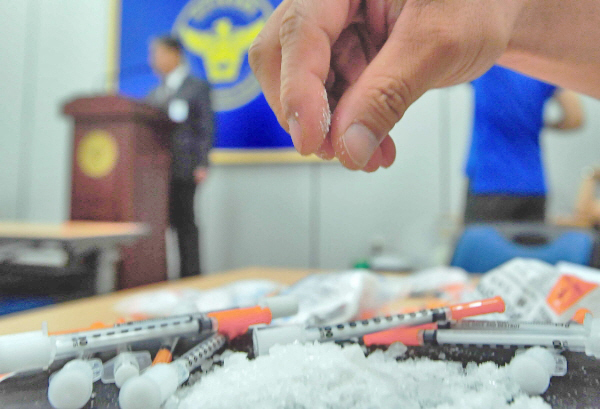
Hwang Ha-na, granddaughter of the Namyang Dairy Products’ founder, received a one-year suspended prison sentence with two years’ probation for drug abuse in 2019. Hwang purchased and injected herself with methamphetamine multiple times. On Dec. 7, 2020, Hwang was prosecuted again for using drugs with her acquaintances. While Hwang Ha-na’s first drug test returned negative results, the case became more complicated as her husband committed suicide and one of her acquaintances, suspected to be the supplier of the drugs, also made a suicide attempt but ended up in a coma. This incident exposed drug issues not only among celebrities but also among the younger population of Korea.
Meanwhile, “Vatican Kingdom”, head of the nation’s largest drug supply chain on Telegram, was arrested by the police on Jan. 7. “Vatican Kingdom” is suspected of smuggling and selling drugs worth billions of KRW, such as methamphetamine, ecstasy, ketamine, and synthetic hemp. These drugs were supposedly smuggled into Korea from the Philippines by “Drug King Jeonsegye”. Along with “Vatican Kingdom”, 90 people including intermediate suppliers, sellers, and buyers were arrested. One of the intermediate suppliers is Nam, who is suspected of injecting drugs with Hwang Ha-na. Among the 62 arrested buyers, 85.6% were in their 20s to 30s; people who are the main users of social media.
A country is generally referred to as a “drug-free country” if it has less than 20 narcotics offenders per 100,000 people. Korea has already lost its status as a drug-free country with 24 offenders per 100,000 people. According to the National Police Agency (NPA), the number of drug crimes increased from 7,905 in 2018 to 10,411 in 2019, a surge of 54.4%. The number continued to rise to 12,209 in 2020, another surge of 17.3%. The number of drug offenders arrested during two months from Oct. 23, 2020, to Dec. 31, 2020, reached 2,460. Compared to the 1,448 people caught during the same period in 2019, the number of drug offenders increased by 82.3%. Some experts estimate that the number of drug offenders in Korea will exceed 300,000 if hidden crimes are added.
Teenagers and people in their 20s in Korea have recently been exposed to drugs. The NPA reported that the number of drug offenders in their 20s increased 230% from 2018 to 2020. The proportion of drug offenders in their 20s also increased from 17.6% to 26.3% during the same period. According to the Supreme Prosecutors’ Office (SPO), the number of juvenile drug offenders also increased 4.2 times from 2017 to 2019. As the internet became the main vehicle for drug sales, drug offenders in their teens and 20s who are familiar with the Internet are also increasing. Moreover, some inexpensive drugs that give strong hallucinations have also been circulating across the nation, making it easier for young people, generally with no fixed income, to purchase them.
Internet-savvy teens and young adults access the “dark web” to find drug dealers. The “dark web” is an Internet network that cannot be easily searched with search engines such as Naver or Google but can only be accessed with specific software. Since IP tracking is nearly impossible when using the dark web, it is used worldwide as a hotbed of various crimes around the world. After finding a dealer, contact is made in a way that is difficult to track, by using Telegram or an overseas messenger. When a purchase is confirmed, the buyer and the seller do not meet in person, but rather a non-face-to-face contact method called “drop” (hiding the object in a public place). Payments are mainly made through crypto currency that does not leave any personal traces. Bitcoins were used a lot over the past few years, but now they use new dark coins that have no record of sending and receiving at all.
Various government agencies such as the Office for Government Policy Coordination, the Ministry of Food and Drug Safety, the Korea Customs Service (KCS), NPA, and the Korea Coast Guard are working together to eliminate drug circulation. The SPO established the “Dark Web Specialized Investigation Team” in the Seoul Central District Public Prosecutors’ Office to crack down on drugs. An official from the NPA said, “It is difficult to track overseas servers, but we are expanding international cooperative investigations by forming a professional investigation team. We will cooperate with relevant agencies such as KCS to conduct intensive investigations that cover all aspects of the drug trade to prevent drug distribution.”



